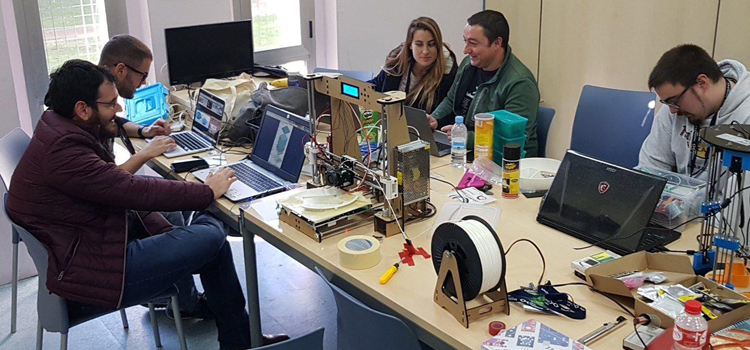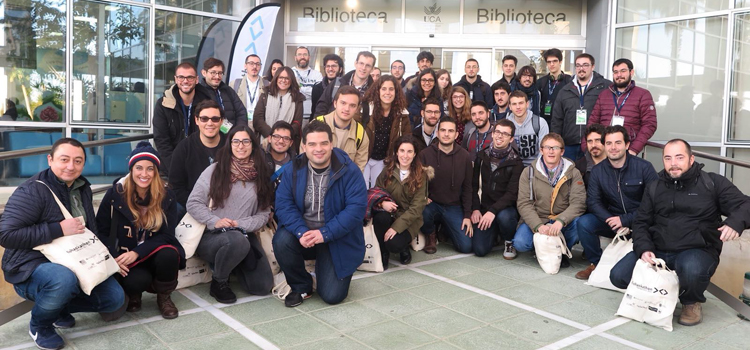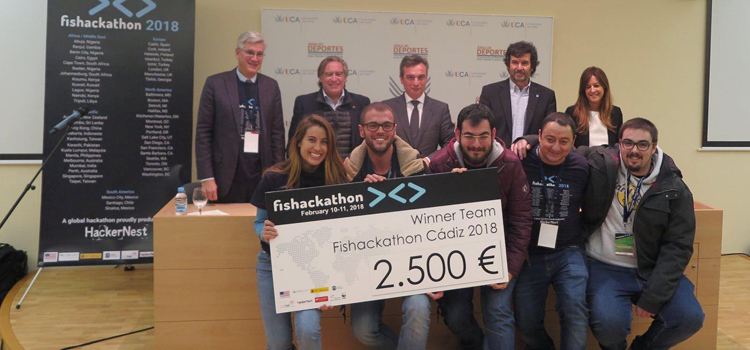The ‘Smart Buoy’ project wins the first prize of the international contest Fishackathon 2018 12 February 2018
The winners, graduates of the Higher School of Engineering of the University of Cádiz, will have to compete in the world finals. The second prize went to a group of students from the University of Almería
The Campus of Puerto Real of the University of Cádiz hosted this weekend the celebration of the international event Fishackathon 2018, an event that was held for the first time in Spain and that has had fifty programmers, web designers, graphic designers, biologists, mathematicians, engineers and students who have worked tirelessly for two days with the idea of creating technological solutions that help solve problems related to fishing and, in this way, protect the oceans and marine life.
The winning team of this Fishackathon has been a group of graduates of the Higher School of Engineering of the University of Cádiz constituted by Mireya López Mesa, David Aragón Jurado, Francisco León Zacarías, Juan Diego Rodríguez Aparicio and Miguel Ángel López Fuster. Their project, Smart Buoy, has focused on the design and development of an automatic probe device to collect information on different parameters that affect environmental quality in fresh waters. This device works in real time, receiving and sending data to the network where end users can perform the desired data processing (graphics, mapping, etc). Smart Buoy is an economic and sustainable tool, an initiative that convinced the jury of the contest unanimously and that has been awarded 2,500 euros, thanks to the sponsorship of Banco Santander, and that will have to be defended in the world finals foreseen within this competition .

It should also be noted that, on this occasion, the court decided to award a second prize, sponsored by Marine Instruments, to the Zeus Faber project, promoted by students from the University of Almería and focused on IUU (Illegal Unreported and Unregulated) fishing. This initiative opted for the creation of an App, aimed at wholesalers and administrations, through which boats that practice illegal fishing can be detected, in addition to the creation of a seal of own quality that indicates to the consumer the quality of the fish that they will consume. The members of this team were Ana Belén Castaño Fernández, Helena Palenzuela Rodríguez and Gustavo Rosell Romo.
This important competition has been organized in Spain by the University of Cádiz, the Campus of International Global Excellence in Marine Science (CEI·Mar), the Embassy of the United States of America in Spain, the Spanish Institute of Oceanography and the Ministry of Agriculture and Fishing, Food and Environment, and has had the collaboration of the NGO WWF. The Spanish participation in this world meeting has emphasized the impact of the eleven problems that have revolved around three major areas such as sustainability, markets and regulatory compliance. Three aspects, which are crucial for the fishing sector.

* Hackathon is a term used in hacker communities to refer to a meeting of programmers whose goal is the collaborative development of software, although sometimes there may also be a hardware component.


